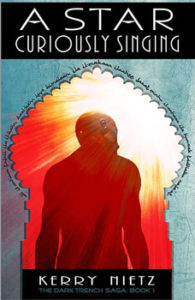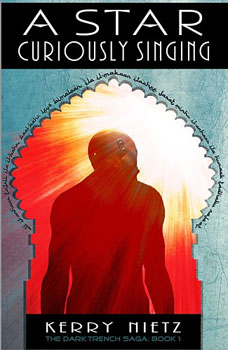‘A Star Curiously Singing’ Shines In A Dark, Droning World
This reader came late to the science-fiction stunner that is the first of author Kerry Nietz’s DarkTrench Saga series from Marcher Lord Press. To this day I’m unsure how I missed this novel until three years after its publication. Its premise alone should have quickly captured me: a nano-wired debugger investigates a mystery, in a future Earth ruled by sharia law.
 Yes, sharia law. That’s the notion of the caliphate, a future one-world government not run by the Beast, but by Muslims. Not all Muslims advocate this, but some do, and people either refuse to admit that, or talk about it overmuch as if they are all coming for our children.
Yes, sharia law. That’s the notion of the caliphate, a future one-world government not run by the Beast, but by Muslims. Not all Muslims advocate this, but some do, and people either refuse to admit that, or talk about it overmuch as if they are all coming for our children.
Come to think of it, the story’s premise backfired in my mind and made me a bit suspicious of the story. A novel honestly exploring that just can’t be published, I thought. No one would be brave enough to explore the logical conclusions of a sharia-ruled world of the future. Even if someone did, the themes or conclusions would be infected with political correctness. And if I flipped my initial pessimism, I might have also thought: It will be too politically conservative. “War on Terror” advocacy will gradually infect an otherwise excellent science-fiction setup.
Now, let me assure you that A Star Curiously Singing is nothing of the sort! Nietz knows his Islam, but also knows how to craft a fully-realized, vivid, dusty, machinery-humming science-fiction world. His first-person style is immediate and not merely the result of a trend. Supporting characters are sympathetic and real. And Sandfly is a remarkable hero.
1. Hero and plot. We catch up to Sandfly right in the middle of his job in an airship dock. He’s a teenager or young adult, a mechanical grunt with more powers than today’s grunts would have. He not only programs machines as a veritable slave to his Muslim masters, he talks to them, sings to them; his mind is itself implanted with equipment to manage this. Imagine a WiFi link in your head. Come to think of it, that would simplify some things.
As a trained machine debugger, Sandfly is neither a poor helpless slave nor a perfectly capable protagonist. He’s practical. Resourceful. Sympathetic. This remains as he is soon summoned for a unique mission, into orbit, to investigate a robot that was on board a mysterious space probe. Something made it tear itself apart. His Masters want answers.
2. People and enemies. Here is another defining strength of A Star: realistic people, including villains who are neither politically-correct Merely Troubled Within, nor Totally Evil. Rather, their motives make sense. As with any religion, you will have both fierce and even honest devotees, and opportunists who are mostly along for the ride. The Masters, and other Muslims whom Sandfly meets, reflect this. (In fact, I doubt the word “Muslim” occurs in the novel; the religion is just there.) This grounds this world even more in reality.
3. Story-world and style. I’ve mentioned the first-person style, which The Hunger Games and other books have recently made more popular. Nietz anticipated the trend. Generally I prefer third-person style; you may also. Yet here, given Sandfly’s immediate links with the world around him and its humming, singing technical equipment, this style harmonizes perfectly with story. Usually it removes, not adds, barriers between reader and character.
Once or twice I had to go back to check something — a seemingly vague description, a bit of sci-fi slang introduced as if I already knew it, an apparent lack of context. Yet that, I’m sure, tended to be a slip of my own, not the author. The best result of that is that unlike sci-fi authors who like to show off their worlds, Nietz simply assumes his is real. Thus, so did I.
Dust. Heat or cold. Metal. Code-and-command singing from machines. All seems vivid to me even as I recall the story-world to write this. The story’s style itself resembles a song. Even apart from the God-exalting hero, plot, villains, and characters, this lifts Him up in worship.
Summary. This story helped me rejoice in our great Author, Who “sings,” shows Himself, and shows great mercy yet doesn’t let the guilty go unpunished. Even in a dusty mechanical world run by legalistic religion, He is there — at first implicit, and then gloriously bright. I haven’t yet read A Star’s two sequels, and already my expectations are high. For example, book 2, The Superlative Stream, promises to add another planet to the mix. How? I wonder.
Despite the story’s initial vagueness, and Sandfly’s practical approach to living, such subtle themes are quickly and naturally clear by the end. To finish this novel, I stayed up late. And I don’t know if I have ever sympathized with or cheered so much for a fictitious robot.






































